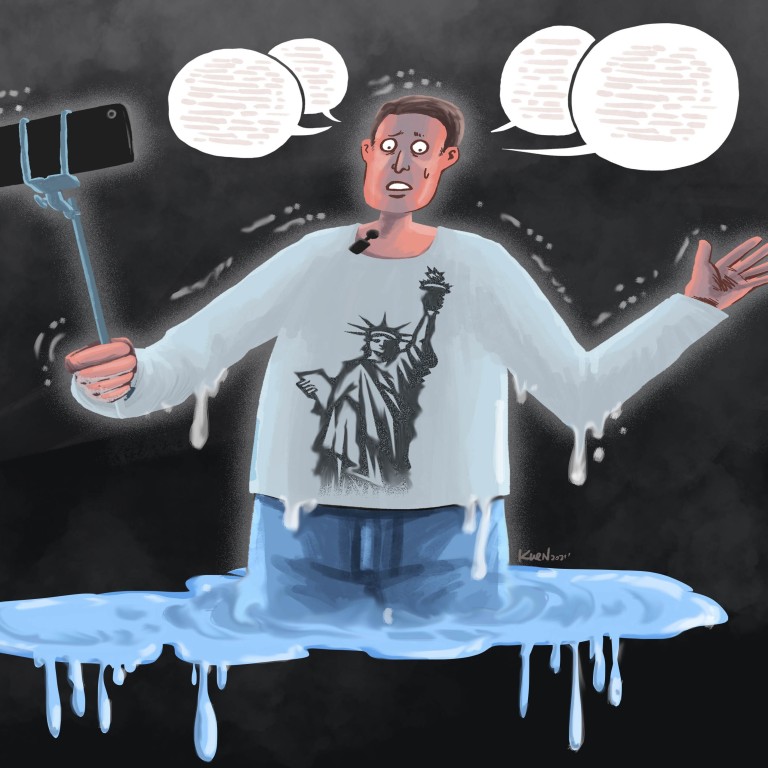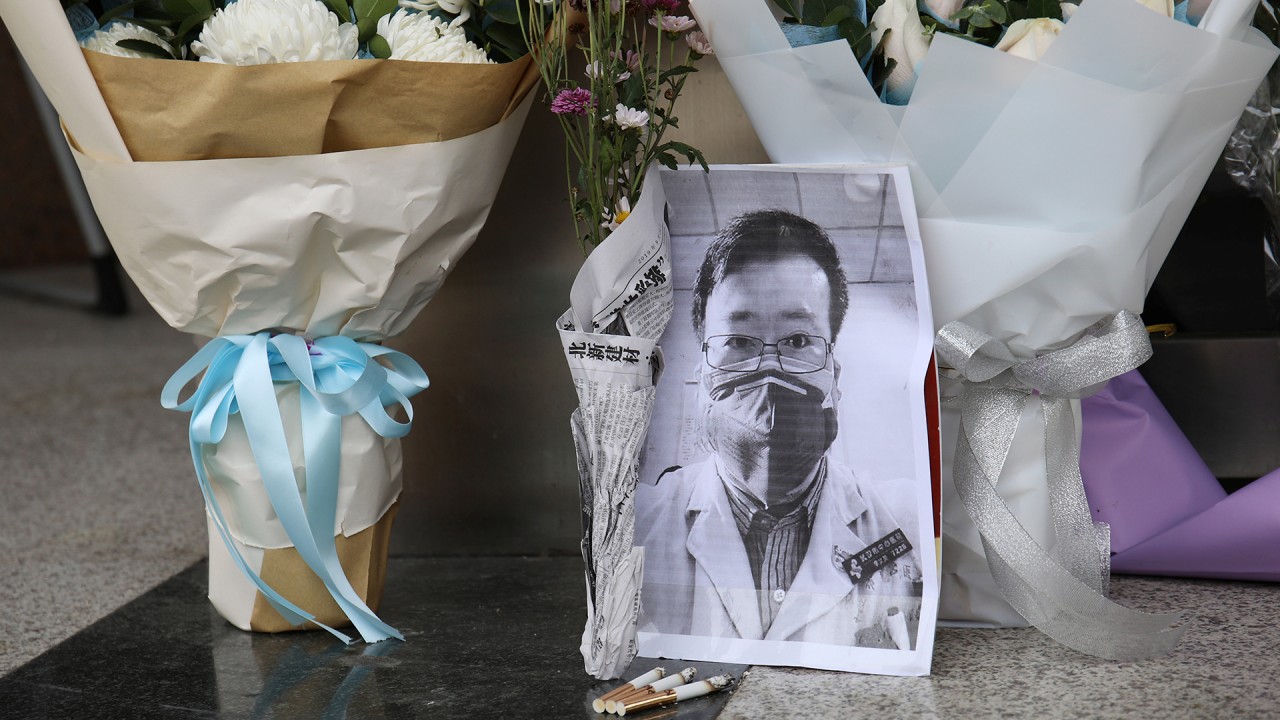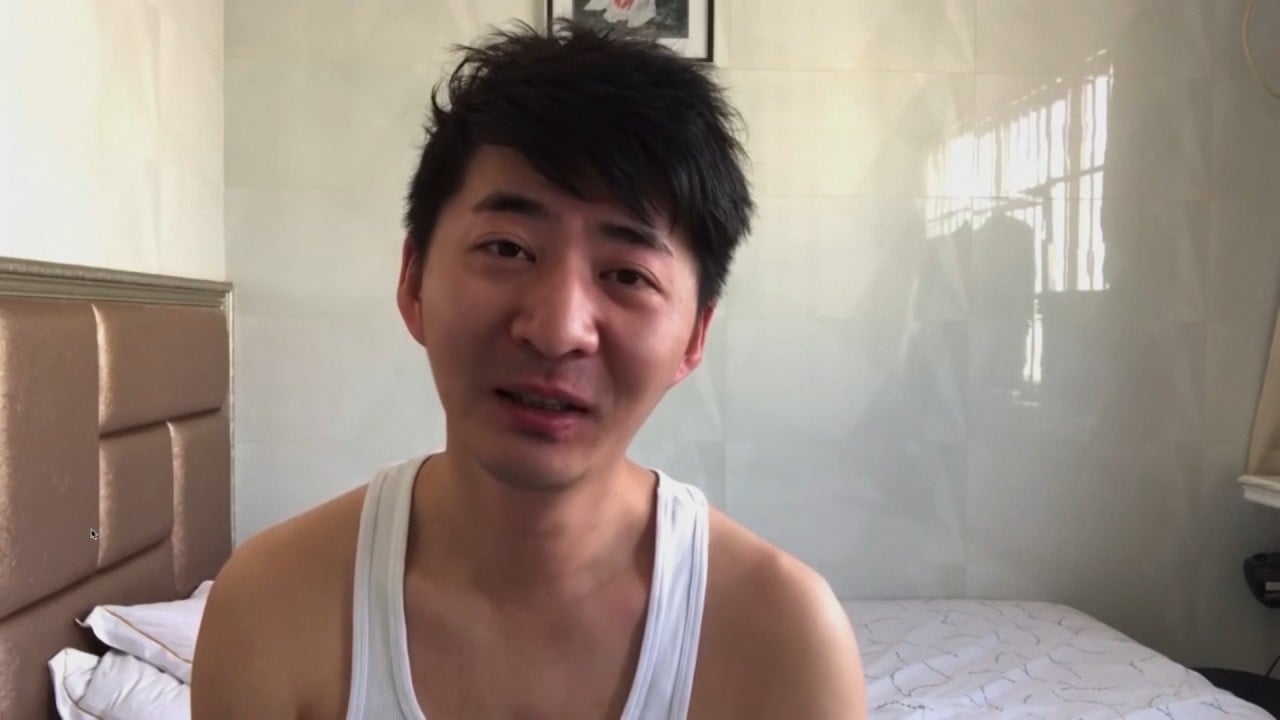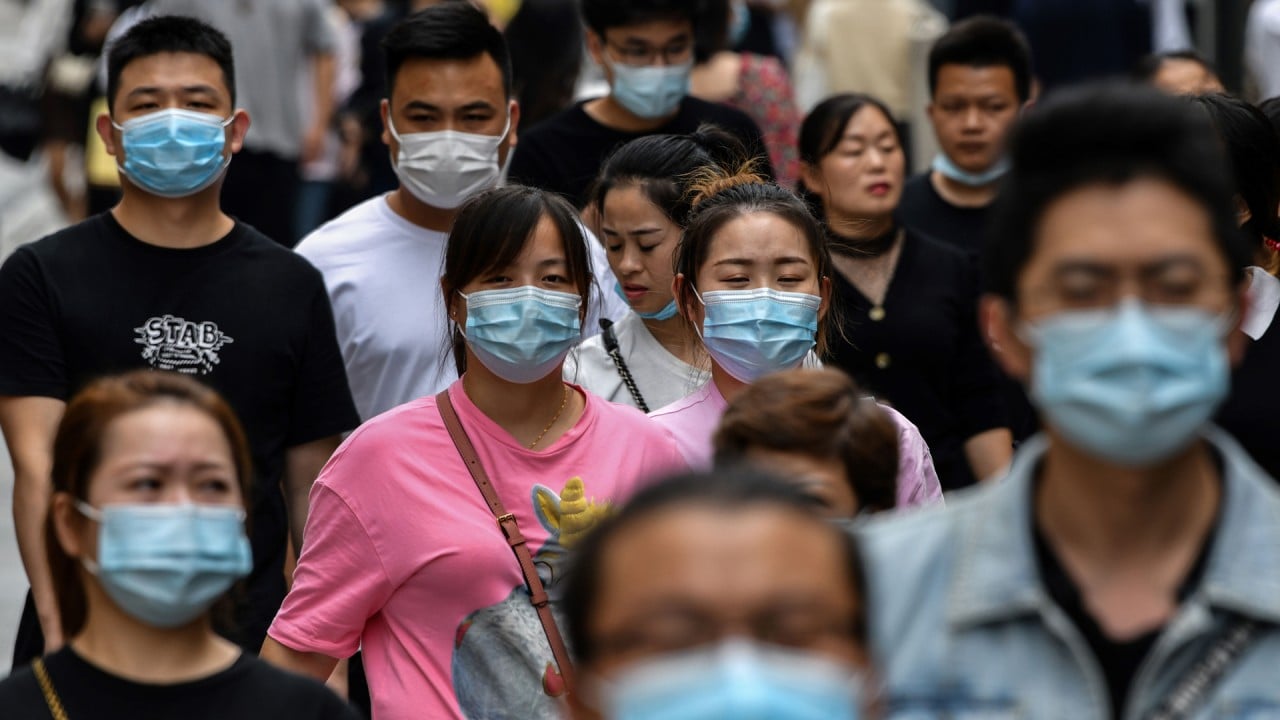
Liberal voices in China fall silent after coronavirus
- Activists fear for future as Chinese people increasingly find Western-style liberalism unconvincing, even irrelevant
- Online outrage spread along with the virus in the pandemic’s early days, but both were brought under control within months
This is the latest instalment of a series looking back at the effects of the coronavirus outbreak one year after it first emerged in the Chinese city of Wuhan. Here, we examine the fate of some of the writers, academics and activists who spoke out in the early days of the pandemic. Please support us in our mission to bring you quality journalism.

For six months, Zhang had refused to plead guilty, beginning a hunger strike soon after her arrest, which continued right up to her brief trial. She attended court in a wheelchair, according to her lawyer Zhang Keke (no relation) and did not say immediately if she would appeal.
During the trial, the prosecutor did not show most of the evidence, while his client said citizens’ speech should not be censored and, apart from that, basically did not speak, the lawyer said.
In a December visit at Shanghai Pudong detention centre, she had earlier told him, “[I am] mentally and physically exhausted. Every day has been a torture”. By that stage, Zhang’s hands were restrained to stop her removing a feeding tube in her nose, while her health continued to deteriorate.
And even among mainland activists, a sense of confusion and desperation was prevalent with many questioning if their push for change has become a lost cause as the authorities grew stronger and became less tolerant of dissent at the same time.
Beijing battles ‘crisis of Chernobyl proportions’ in coronavirus outbreak
The powerlessness of the activists was further exacerbated by the rising tides of nationalism and populism in the country, bolstered by the government’s success in taming the coronavirus and abysmal failure of Western democracies in containing the pandemic.

03:27
Public mourning in China after death of coronavirus whistle-blower doctor Li Wenliang
Ou Biaofeng, a veteran dissident based in the central province of Hunan, said Chinese civil society had entered an unprecedented “ice age” after years of relentless crackdown. Ou was first taken away on December 3 to serve 15 days in administrative detention, and was placed under residential surveillance at a designated location after his detention, allegedly for inciting subversion, according to a police notice issued to his wife Wei Huanhuan.
“The coronavirus pandemic has further cemented the party’s grip over society. Many human rights defenders are anxious and confused as they simply don’t see a way out. Any form of resistance these days is almost guaranteed to draw retaliation and clampdown,” Ou said.
After surviving the biggest public health crisis in modern Chinese history, the party state has shown little interest in recognising a larger voice for civil society and more openness for independent voices. Instead, crackdowns on silent dissent have intensified.
Beijing’s clampdown on criticism of its response to the pandemic has included rounding up citizen journalists and silencing prominent academics and party members who have openly criticised its handling of the crisis.
China tightens censorship on coronavirus as authorities boost propaganda
Citizen journalists – such as Chen Qiushi, Fang Bing and Zhang Zhan – were detained for their on-the-ground reporting in Wuhan. Prominent intellectuals, including former Tsinghua University law professor Xu Zhangrun, was sacked. Cai Xia, a retired professor from Central Party School, was expelled from the party in August and lost her pension – apparently as punishment for criticising the party.

02:39
Lawyer Chen Qiushi documenting coronavirus epicentre disappears
Terminus2049 was started on the Microsoft-owned code-sharing platform GitHub in 2018 for archiving censored posts on Chinese social media platforms WeChat and Weibo.
According to Chen Kun, Chen Mei’s brother and an activist himself, the Chinese government perfected the tools of political brainwashing in the name of patriotic education, censorship and pervasive propaganda.
“When people were in a state of extreme anger and fear, their sentiments exploded into the public. But when lives resumed to a somewhat bearable [level], people fell back into the ‘hole of propaganda’. This was what was most terrifying,” he said.
“For the Communist Party, every disaster has been a drill for its propaganda system and online information lockdown. It ends up being upgraded every time after a major disaster. I’m very pessimistic about the future of free speech in China,” Chen Kun said.
Apart from government crackdown and state censorship, liberal-leaning dissidents and intellectuals faced an unprecedented dilemma as many felt their voices were being lost as the Western models they advocate seem to have failed the pandemic stress test in the eyes of the Chinese public.
Byron Chen Chun, a Shenzhen-based political scholar who recently published the book Political Affect and the Rebirth of Liberalism, said it was a “low-tide” for China’s liberalism and liberal-leaning groups.
Wuhan is rocking now the dark days of the coronavirus are over
“I have repeatedly thought of what a breakthrough might look like for the liberals in China but the more I thought about it, the more pessimistic I got. So much that I have dialled back from writing the past year,” he said.
“China has become more confident from its successful handling of the coronavirus and this is especially so when compared to the rapid decline seen in the majority of Western nations. Even though China is still recovering from the pandemic, it is still progressing when other Western countries are still struggling to contain coronavirus chaos.
“Liberalism that promotes Western democratic institutions has therefore become increasingly unconvincing or irrelevant for the Chinese people at a time like this.”

02:01
China’s Wuhan moves on as global coronavirus death toll passes 1 million
Wen Ji, a Wuhan resident who works as a freelancer, said she, along with her immediate family and friends, was fine and safe in Wuhan. She said surviving was the most important thing to her and she had not paid a lot of attention to the debates on nationalism or the criticisms against the government.
“For us normal people, I think we should let it go. It’s a David versus Goliath situation,” she said. “Those who are still alive should keep on living well. There are many things that don’t have a solution. Letting it go for others also spares yourself.”
In principle, she supported having greater freedom of speech and a civil society, but she did not see how this could be achieved, Wen said. “I think these ideas are good. But it would be very difficult to implement them and the result might not be what was originally intended.”
The Chinese government’s propaganda machine spun the coronavirus outbreak into a show of the country’s national strength, while pushing back against dissent to claim control of the narrative – a tactic that has worked with many ordinary citizens.
China’s aggressive approach to coronavirus criticism ‘not working’
The technology companies running China’s social media platforms employ thousands of content moderators as censors and develop algorithms preventing sensitive content from being published or quickly removing it. Foreign websites and social media platforms such as Twitter, YouTube and Facebook are blocked.
According to researchers at the University of Toronto’s Citizen Lab, censorship against group discussions on the coronavirus can be traced back to January 1 – a day after Li Wenliang warned his medical colleagues of a suspected outbreak.
How WeChat censored even neutral messages about the coronavirus
There was a moment in March when the Communist Party’s online censorship tools were tested, which also related to Wuhan’s whistle-blower doctor.
Ai’s profile was quickly removed, but not before many Chinese internet users translated it into numerous languages and codes, re-uploading different versions of it in a bid to evade the censors. The battle was short-lived and all evidence of it was soon wiped from the internet.
Fu King-wa, a professor of journalism at Hong Kong University who monitors censorship in China, said the incident was a rare and singular event during the pandemic, but it had shown that censorship in China was not monolithic.
Wuhan doctor says officials muzzled her for sharing coronavirus report
It had also revealed that criticisms against local government were sometimes possible – as long as they were not against the central leadership. While the profile of Ai Fen was censored, a March 11 report by newspaper Southern Weekly that examined Wuhan Central Hospital’s failures in protecting its staff, has remained online to this day.
According to political scientist Maria Repnikova, media such as the magazines Caixin and Sanlian Life Weekly, reported on the early days of the outbreak with fewer constraints from the central authorities. In an opinion piece for The New York Times in February, she wrote that this was to help the leadership identify the sources of the problem, assess public sentiment and project an image of transparency.
Fang Fang, an award-winning author and former president of the officially affiliated Hubei Writers’ Association, initially faced little resistance from the authorities for her diary of the Wuhan lockdown, published in real time on social media, and later compiled into a book.
Fang, whose Wuhan Diary was published in English and German, said she could no longer publish new works in Chinese official media – including the Chinese language version of the book documenting her experiences during the world’s first coronavirus lockdown.
Chinese writer hit by nationalist backlash over diary about Wuhan lockdown
Some of her diary entries are still available on China’s internet, but most have been removed. Fang also faced an online nationalist backlash which accused her of fuelling Western criticisms of the country’s handling of the Covid-19 outbreak.
Fu, from Hong Kong University, said that, while restrictions on speech and the press in China had been tightened, the small outburst of public sentiment – and relatively independent reporting – would eventually happen again, at the next major event.
“Just wait for some tipping point – Covid-19 was one of these – a significant event that can draw much public attention, that is really difficult for the government to suppress,” Fu said.

03:07
Wuhan pool party shows China's ‘strategic victory’ over Covid-19, Beijing says
Activist Ou said he remained a firm believer that people were willing to put in the effort to resist, no matter how cruel and oppressive the system had become.
“I’m mindful that social and political transformation is a lengthy and gruesome process but there are people who are still persisting and doing their parts to press on. The next unpredictable turn might just be around the corner even if we don’t see it just yet,” said Ou, 40.
Even though the immediate political impact of people like Zhang Zhan and Chen Qiushi might seem futile, Chinese legal scholar Teng Biao expressed hope for a more open Chinese society, however grim the situation might appear.
“The hope rests on the shoulders of those who still dare to resist. The value of their work should not be measured by immediate political impact,” said Teng, who is currently a human rights scholar at Hunter College in the US.
“Rather, they should be judged from a higher historical perspective. If no one dares to press on, there would really be no hope at all.”












